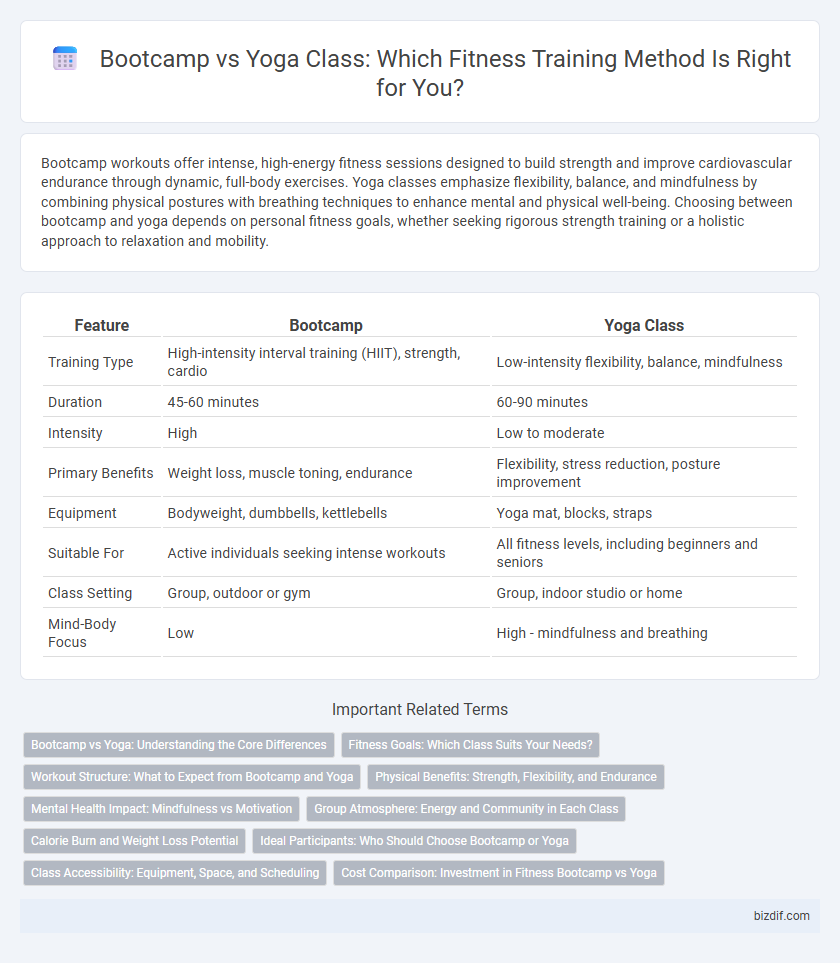Bootcamp workouts offer intense, high-energy fitness sessions designed to build strength and improve cardiovascular endurance through dynamic, full-body exercises. Yoga classes emphasize flexibility, balance, and mindfulness by combining physical postures with breathing techniques to enhance mental and physical well-being. Choosing between bootcamp and yoga depends on personal fitness goals, whether seeking rigorous strength training or a holistic approach to relaxation and mobility.
Table of Comparison
| Feature | Bootcamp | Yoga Class |
|---|---|---|
| Training Type | High-intensity interval training (HIIT), strength, cardio | Low-intensity flexibility, balance, mindfulness |
| Duration | 45-60 minutes | 60-90 minutes |
| Intensity | High | Low to moderate |
| Primary Benefits | Weight loss, muscle toning, endurance | Flexibility, stress reduction, posture improvement |
| Equipment | Bodyweight, dumbbells, kettlebells | Yoga mat, blocks, straps |
| Suitable For | Active individuals seeking intense workouts | All fitness levels, including beginners and seniors |
| Class Setting | Group, outdoor or gym | Group, indoor studio or home |
| Mind-Body Focus | Low | High - mindfulness and breathing |
Bootcamp vs Yoga: Understanding the Core Differences
Bootcamp workouts emphasize high-intensity interval training (HIIT), combining strength, cardio, and endurance exercises for rapid calorie burn and muscle building. Yoga classes prioritize flexibility, balance, and mental relaxation through controlled breathing and static poses, enhancing mind-body connection. Bootcamp targets fast-paced fitness adaptation, while yoga fosters holistic wellness and stress reduction.
Fitness Goals: Which Class Suits Your Needs?
Bootcamp training offers high-intensity, full-body workouts that enhance cardiovascular endurance, strength, and fat burning, making it ideal for those aiming for rapid fitness gains and weight loss. Yoga classes focus on flexibility, balance, and mental well-being, suiting individuals seeking stress relief, improved posture, and muscle toning over explosive calorie burn. Choosing between Bootcamp and Yoga depends on prioritizing either intense physical transformation or holistic body-mind wellness for your fitness goals.
Workout Structure: What to Expect from Bootcamp and Yoga
Bootcamp workouts consist of high-intensity interval training combining strength, cardio, and functional movements designed to maximize calorie burn and build muscular endurance. Yoga classes focus on controlled breathing, flexibility, and balance through a series of poses and mindfulness exercises aimed at improving core strength and mental relaxation. Both offer structured sessions, with bootcamp featuring dynamic circuits and yoga emphasizing slow, deliberate flows.
Physical Benefits: Strength, Flexibility, and Endurance
Bootcamp workouts enhance muscular strength and cardiovascular endurance through high-intensity interval training, promoting rapid fat loss and overall stamina. Yoga classes primarily improve flexibility, balance, and muscle tone by emphasizing controlled movements and deep stretching. Combining both can optimize physical performance by building strength, increasing flexibility, and boosting endurance effectively.
Mental Health Impact: Mindfulness vs Motivation
Bootcamp training enhances mental health through high-intensity workouts that boost motivation and release endorphins, creating a sense of accomplishment and increased mental resilience. Yoga classes promote mindfulness by encouraging deep breathing, meditation, and body awareness, which reduce stress and improve emotional regulation. Both approaches offer distinct psychological benefits, with bootcamp focusing on energizing motivation and yoga emphasizing mental clarity and relaxation.
Group Atmosphere: Energy and Community in Each Class
Bootcamp classes generate high-energy group dynamics fueled by intense workouts and motivating instructors, fostering a strong sense of teamwork and camaraderie. Yoga classes cultivate a calm, supportive community atmosphere through synchronized breathwork and mindful movements, enhancing participants' connection and inner peace. Both environments nurture social bonds but differ in energy levels and emotional engagement.
Calorie Burn and Weight Loss Potential
Bootcamp workouts typically burn between 500 to 700 calories per hour due to their high-intensity interval training and strength exercises, making them highly effective for rapid weight loss. Yoga classes, particularly vigorous styles like Vinyasa or Power Yoga, burn around 200 to 400 calories per hour, offering moderate calorie expenditure while improving flexibility and mental well-being. For optimal weight loss, bootcamp provides a higher calorie burn, but combining yoga can enhance recovery and sustain long-term fitness goals.
Ideal Participants: Who Should Choose Bootcamp or Yoga
Bootcamp training suits individuals seeking high-intensity workouts that build strength, endurance, and cardiovascular fitness, ideal for those wanting quick, full-body results and enjoy a group challenge. Yoga classes are tailored for participants prioritizing flexibility, stress relief, balance, and mindfulness, perfect for beginners, seniors, or anyone recovering from injuries. Choosing between Bootcamp and Yoga depends on fitness goals, physical condition, and preferred exercise pace.
Class Accessibility: Equipment, Space, and Scheduling
Bootcamp classes typically require minimal equipment such as weights and mats, making them accessible in outdoor or gym spaces with ample room for dynamic movements, while yoga classes often need only a mat and a quiet, flat area suitable for stretching and balance poses. Scheduling for bootcamp sessions may be more rigid due to instructor-led high-intensity intervals, whereas yoga classes frequently offer flexible times, including virtual options, accommodating varying participant availability. Both formats promote accessibility but differ in spatial requirements and scheduling flexibility based on the intensity and style of the workout.
Cost Comparison: Investment in Fitness Bootcamp vs Yoga
Fitness bootcamp programs typically require higher upfront costs, averaging $100 to $300 per month, reflecting their intensive group training and specialized coaching. In contrast, yoga classes offer more affordable options, with prices ranging from $10 to $25 per session or monthly memberships around $50 to $100, promoting a cost-effective yet flexible fitness routine. The investment decision depends on personal fitness goals, with bootcamp focusing on high-intensity workouts and yoga emphasizing mindfulness and flexibility.
Bootcamp vs Yoga Class Infographic

 bizdif.com
bizdif.com